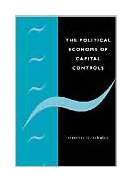|
||
• wydawnictwa polskie
• Zamów informacje o nowościach z wybranego tematu • kontakt
• Cookies na stronie |
POLITICAL ECONOMY OF CAPITAL CONTROLSCHULZE G.wydawnictwo: CAMBRIDGE , rok wydania 2000, wydanie Icena netto: The Political Economy of Capital ControlsGunther G. Schulze DescriptionAlthough globalisation is seen by many as the key economic trend of recent times, restrictions on international capital movements remain the norm in international finance. In 1996 144 out of 186 countries maintained capital controls (IMF). Yet the vast majority of economists object to most controls on capital movement, arguing that they distort the allocation of capital and allow opportunities for fraud. What leads governments to impose restrictions on international capital movements? In this, the first study of capital controls, Gunther Schulze uses a public choice model to explain this behaviour. He considers the many aspects of capital controls, including: quantitative measurements of capital controls, evasion, mis-invoicing, the interaction between an investigating government and an evader, and the role capital controls play in helping governments meet their macroeconomic objectives. In addition to the theoretical and policy discussions the book also contains a comprehensive survey of the existing literature. Reviews'Gunther Schulze covers a wide range of theories on the motivations for capital controls and why they might fail. His eclectic work encompasses models of taxation drawn from real trade theory as well as from international money and finance. Always, the political-economic motivations of governments restricting capital flows, and the likely welfare consequences, get centre stage. A welcome consolidation and analytica elaboration of hitherto diffused writings in a most important area of international development.' Professor Ronald McKinnon, Stanford University 'This book provides a welcome analysis of international capital controls to complement the political-economy view of international trade policies. Traditional efficiency-related reasons for capital controls are examined and are found to be less effective in explaining observed policies than distributional consequences of capital movements. An extensive range of theoretical and empirical issues is investigated, including illegal avoidance and measurement of the effectiveness of capital controls. Throughout there is no presumption that, if a government has imposed capital controls, it must necessarily have done so in the best interests of society at large. Gunther Schulze has provided a comprehensive study of a topic that has not previously benefited from the insights of a political-economy perspective.' Arye L. Hillman, William Gittes Professor of International Economics, Bar-Ilan University, Israel Chapter Contents1. Introduction: Part I. The Reasons for Capital Controls: 2. Political-economic determinants of capital controls; 3. Capital controls in a small open economy; 4. Extensions: large open economy and unemployment Part II. The Evasion of Capital Controls: 5. Ways and means to escape the restrictions; 6. Misinvoicing international trade: imports; 7. Misinvoicing international trade: exports; Part III. Empirical Measurement of the Effectiveness of Capital Controls: 8. The effects of capital controls-unexploited profit opportunities; 9. Return differentials; 10. The correlation of saving and investment; 11. Finale. 298 pages Księgarnia nie działa. Nie odpowiadamy na pytania i nie realizujemy zamówien. Do odwolania !. |


